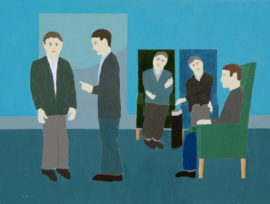Hen Norton explores the use of fundraising platforms online and offers her top ten tips to help you build a sustainable creative business or project, and reach a wider and more engaged network of supporters through crowdfunding.
Five Years is a collaborative artist-run project in London. Its activities include exhibitions, a reading group, publications and workshops in local libraries. This profile includes a video interview, recorded at Assembly Thamesmead, with Five Years member Phill Wilson-Perkin, who outlines the project’s aims and explains why its co-operative and collaborative nature has contributed to its longevity.
Laura Yuile is a London-based artist whose practice is concerned with issues around domestic and urban space and how changes in the built environment and technology affect our everyday lives. This profile includes a video recorded at a-n’s Assembly Thamesmead event in October 2019.
Art Licks is a London-based platform that supports artist-led activity and grassroots visual culture in the capital. This profile includes a video recorded at a-n’s Assembly Thamesmead event in October 2019, in which Director Holly Willats introduces the organisation she founded in 2010.
Bow Arts Trust is an arts education charity which provides affordable work space to artists and creative businesses in London, alongside an award-winning education programme that works with over 100 schools. This profile includes a video interview with project manager Joss Taylor, recorded at Assembly Thamesmead in October 2019.
a-n/AIR’s Exhibition Payment Guide calls for written confirmation of exhibition and financial details in the form of a contract or letter of agreement. This quick guide offers 12 key points an agreement should cover.
Negotiation is one of the four core principles of a-n/AIR’s Exhibition Payment Guide. This quick guide offers 10 tips for better negotiation.
Sectoral guidance and framework, produced by a-n and AIR as an outcome of the Paying Artists Campaign, providing specific advice on payments within the context of exhibitions or other visual arts presentation to the public.
A best practice reference guide to use when creating an agreement for a solo or group exhibition with a gallery or organisation presenting visual arts. You can also use the a-n Contracts Toolkit to build a contract to the specific exhibition context, and this checklist will support you with this.
Rosemary Shirley explores new approaches to curating in rural contexts including New Geographies, a project developed by a consortium of nine arts organisations based in the East of England, and Ian Giles work as part of the project, Open Ramble East, which looks at queering rural places through rambling walks.
Jo Hodges and Robbie Coleman’s collaborative and multi-disciplinary practice questions our relationships with environment and landscape. Sally Davies talks to the Dumfries and Galloway-based artists about working in, and interpreting, rural contexts.
Peak is an arts organisation based in the Black Mountains in Wales that works with artists and communities to respond to the rural environment. Peak’s Creative Director Rebecca Spooner speaks to Rosemary Shirley about the organisation’s contemporary arts remit for making and showing art in rural places.
Artist Morag Colquhoun, whose practice includes sculpture, photography, installation, performance, video, textiles and curatorial practice, discusses the benefits and pitfalls of working in a rural context.
Proactively seeking out opportunities to realise exhibitions and projects is an important strategy in the arts. Adam Smythe, Curator at the Bluecoat in Liverpool, gives some advice on the best methods of approaching galleries with exhibition proposals for your own work or for curatorial projects.
For this follow up to her Approaching galleries guide, Jennie Syson asked artists, arts managers, curators and gallery directors to share their top tips, and dos and don’ts advice.
Jennie Syson offers some advice on approaching galleries, through setting out the different research routes and methods you might use.
Chris Sharratt, who as a freelance writer and editor has written for Frieze, the Guardian, Art Agenda, Sculpture Magazine and Art&Education and been arts editor at Metro, shares his experience and offers some top tips to consider when writing art reviews.
a-n Blogs is a great place to share the process of your practice or the progress of a residency or project you’re working on. We’ve pulled together a few tips on blogging on www.a-n.co.uk to help you get started.
London-based artist Liz Atkin creates work both in response to and as way of coping with compulsive skin picking. Alistair Gentry finds out more about her art practice, and the advocacy and education work she undertakes to help others understand and deal with this and other body-focused repetitive behaviour conditions.
Since the early 1970s, Bobby Baker has been producing art that documents and subverts her experiences of everyday life, drawing on motherhood, domestic labour, and mental illness and recovery. Speaking to Lydia Ashman, Baker reflects on the challenges she faced as a woman and an artist, her successes and why she’s ‘proudest of keeping going’.
Based on conversations with artists, Alistair Gentry reflects on the stigma that still exists around mental health, and discusses some of the coping strategies artists use in their work and careers when affected by mental health problems.
The Bethlem Gallery in Bromley provides a professional platform for artists who have experienced mental health difficulties. Alistair Gentry speaks to the gallery’s director Beth Elliot about the organisation and how it fosters a supportive artist-focussed environment.
Hospital Rooms is an arts and mental health charity that believes in the enduring power of the arts to instill value, dignity and wellbeing in people. Alistair Gentry speaks to Curator Niamh White about how the project enables access to art and culture for people using secure and locked mental health services.
Alistair Gentry offers guidance on what support is available for artists and others with mental health problems.
a-n’s former External Programmes and Partnerships Manager Hannah Pierce offers advice on the benefits to artists of mentoring and coaching, and highlights some of the differences between these two approaches to interaction and personal, professional development.

























